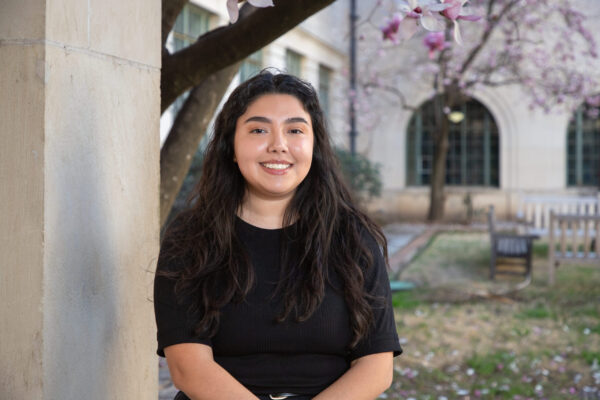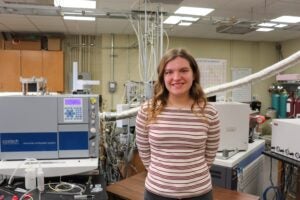Dalia Vazquez didn’t always see herself as a human geographer. “When I applied to The University of Texas at Austin, I was like, ‘I want to do STEM,’ because that’s what my high school was emphasizing — with very valid reason,” she explains. Hampton Preparatory in Dallas, which Vazquez attended before becoming a Longhorn, serves a low-income student population and was invested in its students’ financial wellness after graduation. As Vazquez puts it, “Social sciences are not typically known to produce money or give stability.”
But when she wasn’t admitted to the biomedical engineering program and instead entered the University as undeclared, she began exploring her options, and two standout pre-college internship experiences drew her to a new path. Through these experiences, she discovered the Research Mentorship and Apprenticeship Program (Research-MAP), where she embarked on groundbreaking collaboration with a professor and mentor and began preparing herself for exciting professional opportunities beyond the Forty Acres.
In addition to heading to graduate school this fall, Vazquez, who graduated in May, is working toward co-authoring a paper about her work. We sat down with her to learn more about her experience at UT as a first-generation student, what her research project entailed and how the Research-MAP program impacted her.
What sparked your initial interest in human geography?
Right before I started at UT, I had this cool internship in DeSoto, south of Dallas. Basically, I was an IT intern. And I found this great person — Jerry Hicklin, he’s a Geographical Informations System (GIS) manager—and he introduced me to how geography and technology can be used for the benefit of the community. I realized I liked that feeling of using school to help the community. That was the first time I felt really passionate about something, so I decided to take a course. I talked to the geography advisor for undergraduates, and he laid out all the things I was passionate about and made me feel like this was the major I needed to be in, because it all aligned. After that, I took my first human geography course with professor Paul Adams, who later became my honors advisor for the project I’m working on now.
What is your Research-MAP project?
This project is on Latinos and climate change communication — specifically Texas Latinos and how different generations transfer information, how they receive and perceive it, and where that information comes from. This is interesting because there are multiple generations of immigrants who are still holding on to their culture of origin, still practicing that, but they’re in a society where we have to speak English, where we have to pick up the dominant culture.
I was interested to see if there was any generational difference, specifically looking at environmentalism and how that can differ from people’s backgrounds and how they choose to live their lives in the U.S. I think Texas is also unique because of the political climate as well as the different areas of the state that have natural disasters and events that are impacting these populations, and I wanted to get a better understanding of that.
For methods, I had a lot of work experience in GIS and I wasn’t sure how to transition to human geography. This is where my mentor came in. I had only taken one course in human geography, so I was really trying to catch up with everyone else in the field. Qualitative work is a big approach that human geographers take, but I had an interest in quantitative work. So professor Adams and I used the Yale Climate Change Communication, a national survey of environmental attitudes, to pair that quantitative work with qualitative and we had a mixed-methods project for Research-MAP.
The qualitative work was the biggest portion that I completed. I was basically cold-calling relatives and friends of relatives and going to conferences and pitching my project to people. I traveled to Houston to interview people, and I conducted the interviews over the phone and via Zoom. Often in the social sciences, it can feel like, “What are you doing? You’re not in the lab.” But I’m transcribing — this is my lab, I create my own lab!
Research-MAP also helped emphasize all sorts of research. There were people in my cohort who were doing biology, working with fish, working with other STEM-like things, but there were also people using constitutions and doing work in psychology. Those were the times where I realized that we all see ourselves as researchers. No one’s different, whether or not we’re in a lab setting. It was validating in many ways.
What have been the highlights of your Research-MAP experience?
Being allowed to have the space to do interdisciplinary work was beneficial to my project, to the field, to Latinx geographies, to how we continue to build in the discipline. Geography is changing in terms of becoming more diverse and inclusive to ethnic and racial geographies, but there’s still a lot of work that can be done. Research-MAP allowed me the opportunity to network and build on the platform of other scholars of color.
How has being a first-generation student shaped your experience on the Forty Acres?
I think there are multiple layers to it. Being at UT made me rethink what it means to be a Texan. Being Texan, being Mexican, being Mexican American, being a second-generation immigrant and what that means in Texas… The first few semesters were rough as a first-generation college student — there was a lot of imposter syndrome. One thing I heard during orientation was that UT’s so big, but it will feel like home after a while. I thought, “I’m undeclared, I don’t have friends, I don’t have a community yet.” But that was yet to come. I found that through programs like Mellon Mays, McNair — those cohorts and being part of my major, and later, my research friends from Research-MAP — they helped make the University feel like home.
What advice would you give to students considering applying to Research-MAP, especially fellow first-gen students?
I feel like people get into research in different ways. But if, in class, you read something and your heart flutters or you feel this warmth in your brain, I think that’s enough motive to want to apply for research. I think students of color and low-income or underrepresented students oftentimes cut themselves short from research or academia because we can’t see ourselves doing it or we don’t see the value in doing it.
If you want to make a change, even if it’s a small one, I think it’s worth applying. It seems intimidating, but programs like Research-MAP make it easier to facilitate connections, to get your name out there, to go through the process itself. Going through the process of creating a project is something I think every student should dive deep into. Because really what shapes academia is the unique backgrounds that every researcher has. Your ethnic, racial, cultural, economic backgrounds, and the experiences that you have because of those attributes, shape the way you approach research.
Ready to kick-start your own research project? The next Research-MAP application will open in Fall 2023, and all full-time undergraduate Longhorns are eligible for consideration. For more information, including information session dates and funding details, please visit the Research-MAP website.




